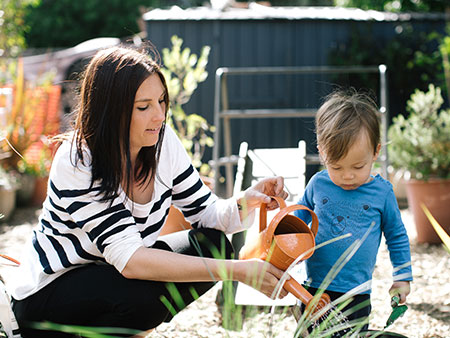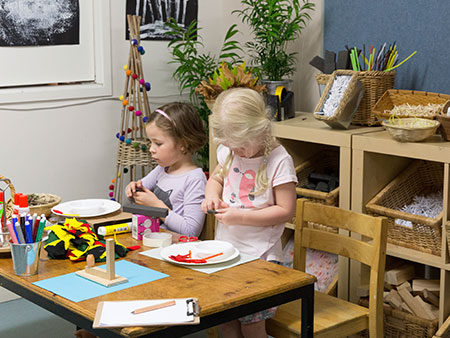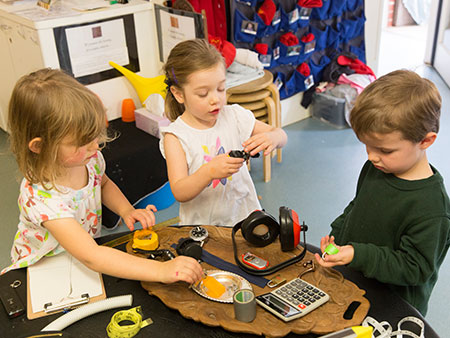Our Philosophy
We would like to recognise the traditional owners of this land, the Wurundjeri people, on whose land we build our community today.
“We would like to thank you, the people of the land in which we play and learn, the Wurundjeri People. This is the land, this is the sky, here are my friends, and here am I. Wominjeka!”
We aim to recognise Early childhood education as the foundation for lifelong learning and to provide an appropriate environment that is safe, relaxed, warm, and nurturing, ensuring each child, family, and
educator feels a sense of belonging.
The early years are a time for children to experience a sense of being by enjoying the present moment, reflecting on past events, and exploring life’s wonders.
Through the many experiences and changes that occur in the early years, children become active citizens while growing and developing, creating their own sense of identity. Becoming a person who actively collaborates and connects with local and global communities.
The Child
We recognise the rights of ALL children to participate in a quality and inclusive early childhood program. This is regardless of their circumstances, gender, and capabilities. We believe children have a strong sense of autonomy and take part in decisions that affect them.
We support and encourage children to develop a growth mindset through their learning dispositions and we understand that identity is influenced by past and present. We understand that children’s learning and development are affected by their wellbeing.
We put children’s safety and wellbeing first and embed a commitment to child safety in every aspect of our program and practice. Our commitment to child safety includes taking deliberate steps to protect children from physical, sexual, emotional, and psychological abuse and neglect.
We use a trauma-informed approach that involves understanding, recognising, and responding to the effects of trauma and stress on a person.
Children are supported to develop ‘social competence’ and the ability to interact with others with care, empathy, and respect. Social competence is the foundation that allows children to understand and self-regulate their own emotions and negotiate their interactions with others.
The Educator
Our role as educators is to assist children to achieve their full potential by extending and facilitating their needs and interests and promote the child’s voice and contribution. Our continuous cycle of planning, implementation, and assessment of learning and evaluation with a focus on critical reflection drives our emergent child-centred curriculum.
We strive to create a sense of belonging, where children can develop self-confidence, feel valued and connected to others, and develop relationships. We respect children as competent, capable, and active participants in their learning. Our inclusive programs and practice promote gender equality and create respectful partnerships.
The dedicated and passionate educators offer opportunities to explore, investigate, experiment, and participate in shaping the learning environment. We enable children to learn to respect and care for living things and believe in facilitating their learning through quality adult–child interactions, including sustained shared thinking. We believe adventurous play is about creating opportunities for children (and adults) to explore and test their own capacities, manage risk, and grow as capable, resourceful, and resilient children and adults. This is an environment that supports a play-based program, where the rights and best interests of the child are paramount. Our educators are committed to providing high expectations for all children’s learning and developmental capabilities, recognising that all children learn and develop in their own unique way.
The learning environment
Careful attention to detail and design of the indoor and outdoor environments are paramount as the environment is looked upon as the third teacher. Our inclusive environment reflects the cultural diversity of Australia, providing opportunities that facilitate choice, independence, inquiry, communication, and peer interaction. [i1] The materials and resources found in our rooms are derived from the natural world, with a focus on repurposing and recycled materials. There is joint ownership of space and reciprocal decision-making. Our commitment to the three pillars of sustainability includes a focused lens on the environment, social and economic elements, and how they interconnect with one another.
We encourage environmental awareness through sustainable practices such as the management of worm farms, water tanks, and compost bins within the centre. By involving children in all aspects of planning and caring for the natural and built environments the voice of the child is respected and valued. The programs offer choice and flexibility and documentation pertaining to the child is accessible to their families. We are dedicated to continual improvement through reflection on our own practices and procedures.
Our Families
We recognise and respect children’s and families’ beliefs and values and have an awareness of children’s differences and diversities. The support and information given by the families are crucial to maintaining high-quality care and education. Families provide the bridge between the centre and home by sharing information, unique skills, cultural value, and a sense of belonging for the child to their learning community. Children and families have an important role in providing feedback used to support and develop our quality curriculum. We have a cultural safety commitment to assist families in understanding e-safety and use of media with young children.
The Early Childhood Frameworks
The National and Victorian Frameworks provide the foundation for our program goals and objectives; it reflects the true value of learning outcomes in a strength -based setting. The frameworks encourage educators to view the child in a holistic way that support the development of multiple intelligences, based on the individual child’s interests, strengths, values, beliefs and diversities. Foundations for literacy and numeracy—are firmly established, connecting school and book language with real-world experience and building number sense through creative play. Intentional teaching is thoughtful, informed, and deliberate. Nutrition health and physical activity are carefully planned and prepared for daily.
Through collaborative leadership and teamwork, we use critical reflection as part of our everyday professional practice.
Cultural responsiveness and a commitment to embedding Aboriginal and Torres Strait Islander
perspectives in all areas of professional practice
We commit to advancing children’s engagement in Reconciliation, respect, and recognition of the world’s oldest continuous living cultures. We provide culturally safe and secure environments for children and families and acknowledge the histories, cultures, languages, traditions, religions, spiritual beliefs, child-rearing practices, and lifestyle choices of our families. We believe in forming ethical partnerships with our local and global communities. Relationships of mutual respect and trust are established through reaching out and connecting with the local businesses, and organisations as well as regular excursions and incursions. The community is seen as a source of knowledge, rich in ideas and opportunities to gain a greater understanding of different cultures, traditions, beliefs, and values and expose the children to the wider environment.
Philosophy Developed by: the Educators, Committee of Management Children and Families of Wattletree Early Childhood Centre
[1] Loris Malaguzzi (1920-1994) founder of the ‘Reggio Emilia’ approach


